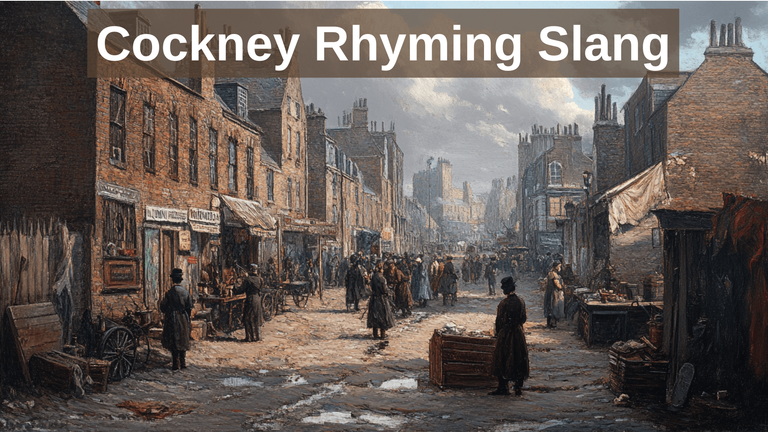London’s Secret Language

Have you ever heard someone say, “Use your loaf!” or suggest a trip “up the apples and pears” and felt confused? You have just come across someone using Cockney Rhyming Slang, a unique language from London’s East End. It is more than just an odd dialect. It’s a playful, coded language that is rich in history and culture.
What Is Cockney Rhyming Slang?
Cockney Rhyming Slang is a slang language or code where words are swapped with rhyming phrases with a clever twist! Usually, only the non-rhyming part is spoken, confusing anyone who doesn’t know it.
Example:
- “Apples and pears” rhymes with “stairs,” so it’s shortened to “apples.”
- “Let’s go up the apples!” means “Let’s go upstairs!” in Cockney slang.
- This playful language has made Cockney Rhyming Slang a unique part of London culture.
From Local Markets to Worldwide Recognition
Cockney Rhyming Slang began in the mid-19th century among working-class people in London’s East End. The heart of Cockney culture is traditionally within hearing distance of the Bow Bells at St. Mary-le-Bow church in Cheapside. The area is known for its busy markets and tight communities, which is where this unique language style started.
Market traders and street vendors likely created rhyming slang for coded communication. This would have helped them talk secretly, possibly to confuse law enforcement, competitors, or customers in the busy East End markets.
Key historical notes:
- Criminal Undercurrents: Early Cockney slang, like “tea leaf” for “thief” and “bacon rind” for “blind,” suggests its use in secretive circles. This link to Victorian London’s underworld adds mystery and a rebellious charm.
- Cultural Identity: “Cockney” has evolved from referring to those born near Bow Bells to representing a broader East End heritage. Cockney Rhyming Slang helped shape a unique identity for EastEnders.
- Class Pride: In a society with clear class divisions, Cockney slang was a source of pride for East London’s working class. It showed their resilience and creativity amid poverty. It was a way to assert identity and belonging. Academic studies on class and language can be found in journals like Social History.
- Multicultural Influences: The East End, a cultural melting pot, influenced Cockney slang. It absorbed words from immigrant communities over time. “Ruby Murray” for “curry,” after a 1950s Irish singer, shows the blend of popular culture and multiculturalism.
- Literary Roots: Authors like Charles Dickens noted early Cockney slang. In Oliver Twist, he hints at “twist,” meaning
- “wife,” showing the slang’s early role in London’s language scene.
How It Works: A 2-Step Guide
Understanding Cockney Rhyming Slang involves two steps:
**Replace a word with a rhyming phrase: **Find a phrase that rhymes with the word you want to replace. These phrases are often arbitrary and humorous:
- “Phone” → “Dog and bone”
- “Mate” → “China plate”
Drop the rhyming word: The key step. Use only the first part of the phrase as the slang term:
- “Dog and bone” becomes “dog” → “I’m on the dog!” (I’m on the phone!)
- “China plate” becomes “china” → “Alright, me old china?” (Alright, my old mate?)
Cockney Rhyming Slang Simplified
Phrase: “The trouble and strife’s on the dog, telling me to use me loaf!”
Breakdown:
- “Trouble and strife” rhymes with “wife” → Wife
- “Dog” (from “dog and bone”) rhymes with “phone” → Phone
- “Loaf” (of bread) rhymes with “head” → Head
Translation:“ The wife’s on the phone, telling me to use my head!”
This example shows how Cockney rhyming slang uses phrases that rhyme with the intended word to create a playful and coded way of speaking.
Still Popular
Cockney Rhyming Slang is still popular and evolving for several reasons:
- Pop Culture Influence: It’s widely recognized due to its use in films like Snatch and Lock, Stock and Two Smoking Barrels, as well as TV shows like EastEnders and Peaky Blinders. These media help keep the slang alive and introduce it to global audiences.
- Global Reach and Flexibility: Cockney slang has spread beyond London, influencing languages in other countries. For example, Australian slang uses “rack off,” meaning “leave,” and in the U.S., “bangers and mash” can mean “cash.” Modern phrases like “Britney Spears” for “beers” show its ability to adapt to new trends.
- Humor and Wordplay: The slang is playful and creative, using clever associations like:
- “Trouble and strife” = Wife
- “Jam jar” = Car
- “Aristotle” = Bottle (of beer)
- Cultural Celebration: Events like the Modern Cockney Festival celebrate and preserve Cockney culture and its unique slang.
Ready to Learn More?
We’ve only just started exploring Cockney Rhyming Slang. It’s a fascinating and fun language style with much to offer. In upcoming sections, we’ll decode over 100 Cockney terms. From quirky slang for body parts, like “mince pies” for eyes and “plates of meat” for feet, to modern additions like “Britney Spears” for beers. Plus, we’ll look into the playful Cockney Alphabet, where “A” stands for “hay.” Stay tuned!
Your Turn!
Have you heard Cockney slang in real life or on TV?
What’s your favorite phrase?
Share your thoughts and favorite expressions in the comments!
Next Post Teaser
“Why do Cockneys call eyes’ mince pies’ and feet’ plates of meat’?
Discover the quirkiest body part slang in the next post!”
Images created using MidJourney and Canva, for which I hold a commercial license.
Edited with assistance of Grammarly.
#CWH #Cockney #Rhyming #London